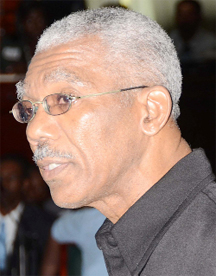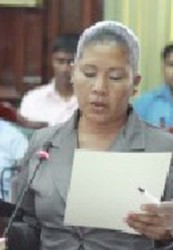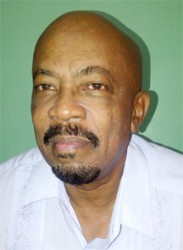The National Assembly on Thursday voted to set up a Commission of Inquiry to be appointed to investigate the gastro-like illness in the North West District, since there are several outstanding questions, including how many children actually died.
After a fiery debate on Thursday night with impassioned speeches from both sides of the House, the motion to appoint the COI was passed.
Opposition leader David Granger, who brought the motion, said that it should be of concern since children died and more than 500 people had fallen ill. He urged members of the House to seek answers to determine the causes, to look at the conditions that exist in Region One (Barima/Waini), to look at the cause of the crisis and its consequences.

According to Granger, he is seeking a solution to what occurred so as to prevent a recurrence. “This commission is necessary because of the repetitive nature of this particular disease,” he said, adding that a previous minister of health had pointed out that between December and March there was always a rise in the number of gastro cases. Granger pointed out that the minister had said that this was the deadly period. “In other words, this is something that could have been anticipated…,” he said.
He also said it was necessary to hold the inquiry since it was also determined that the most vulnerable were children and so far there were three confirmed deaths of infants aged 12 months and younger.
Granger also pointed out that there has been no word from the six government ministries that should have been concerned about what was going on.
He said there are three aspects that need to be looked at: health, public works and public information.
The opposition leader also spoke extensively about the poor response of the Health Ministry to the situation, noting that although the ministry kept saying it was on top of the issue and the outbreak was under control, it was only after the deaths that it swung into action. “We don’t know up to now how many people suffered and how many people died. That is why we are calling for an inquiry,” Granger said, while those on his side of the House banged on the tables.
The opposition, he noted, is not satisfied with the readiness of the government to respond to a crisis of this nature; with the ability of six ministries to coordinate their efforts and to manage this crisis; with the dissemination of timely information to the public and to the Assembly; that the infrastructure has been installed to provide safe water to residents; that arrangements have been made for the proper disposal of solid waste and about the way the entire region was treated “as if it was part of the bush”.

‘Good track-record’
Health Minister Dr Bheri Ramsaran, who said that there was no need for a Commission of Inquiry, argued that there was no “ineffective, one-sided, uncoordinated approach to the response”. He denied Granger’s claim that the response by the ministry to the outbreak was not timely. According to Ramsaran, the Ministry of Health has a good track record when it comes to responses to outbreaks in interior regions. He stressed that the ministry was on top of the situation in the North West.
He said that a team had gone into the area prior to the team which was being referred to by the opposition.
APNU’s Region One representative Rennita Williams told the House that while she took note of what Minister Ramsaran said about the deaths being used for political mileage, she was disputing that claim. She said the call for the inquiry is to “bring the facts to the House and look after the welfare of the people”.
Williams said what occurred was a clear indication that more needs to be done in that region.
Minister within the Ministry of Local Government Norman Whittaker stated that it all started with isolated cases. He said health workers are trained to diagnose the illness which is common in the hinterland area and those where there is mining activity. He said the health worker was able to diagnose and treat these isolated cases.
Whittaker said collaboration started at the Port Kaituma Hospital to which persons were referred and treated. He noted too that surveillance started in January and “not March when the big team arrived”.
At the regional level, he said, there were the village people, health workers, the hospital, the Guyana Geology and Mines Commission, persons from the business community and concerned miners.

He said the response at the national and regional level was immediate, extensive, coordinated and effective. According to him, any inquiry would find that pit latrines not properly constructed by residents and in some cases situated close or over the waterways were all contributing factors to what occurred.
He also questioned the timing of the call for the inquiry.
Former health minister Dr Leslie Ramsammy opined that the House should first utilise all the mechanisms “at our disposal before we go outside of this House to find answers”. He said he would support going further is there is no satisfaction after this.
Ramsammy, who is now the Agriculture Minister, said that whenever a child dies “we should want to have all of the mechanisms we have in place utilised to examine those reports”. He said there are mechanisms in place, “to prevent these things from happening; and two to respond”, noting and despite the ministry’s best efforts there are still illnesses. Also giving presentations were AFC’s Valerie Garrido-Lowe, Amerindian Affairs Minister Pauline Sukhai, APNU’s Dr George Norton, and APNU’s James Bond.





